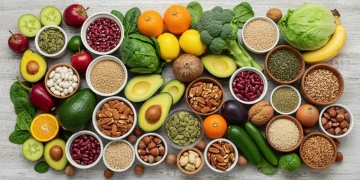Gut Microbiome 2025: Diet for Digestion & Immunity

The gut microbiome in 2025 is increasingly recognized as central to overall health, with dietary interventions serving as powerful tools to optimize its composition for improved digestion, fortified immunity, and disease prevention.
As we navigate 2025, the scientific community continues to unravel the profound influence of our internal ecosystem. Understanding the role of gut microbiome in 2025: dietary interventions for improved digestion and immunity is no longer just a niche topic but a cornerstone of modern health and wellness. This intricate community of microorganisms residing in our digestive tract dictates far more than just nutrient absorption; it plays a critical role in our immune system, mood, and even chronic disease prevention.
The evolving understanding of the gut microbiome
The concept of the gut microbiome has evolved dramatically over the past decade, moving from a mere collection of bacteria to a complex, dynamic organ influencing virtually every aspect of our physiology. In 2025, research is focusing not just on identifying species, but on understanding their functional roles and intricate interactions within their ecosystem.
Scientists are now capable of mapping individual microbial strains with unprecedented precision, revealing personalized gut signatures. This advanced understanding allows for more targeted interventions, moving beyond broad recommendations to highly specific dietary and lifestyle adjustments based on an individual’s unique microbial profile.
Beyond basic bacteria: archaea, fungi, and viruses
- Archaea: Often overlooked, these single-celled organisms play roles in methane production and nutrient cycling within the gut, influencing gut transit time.
- Fungi (Mycobiome): While less abundant than bacteria, gut fungi can impact immunity and metabolism, with imbalances linked to various health conditions.
- Viruses (Virome): Bacteriophages, viruses that infect bacteria, are crucial regulators of bacterial populations, maintaining ecological balance in the gut.
The holistic view of the gut as an interconnected microbial universe underscores the complexity of maintaining its balance. Future research will likely continue to uncover the synergistic and antagonistic relationships between these diverse microbial inhabitants, paving the way for novel therapeutic strategies.
Dietary interventions: the foundation of gut health
Diet remains the most powerful and accessible tool for shaping the gut microbiome. What we eat directly feeds or starves specific microbial populations, leading to rapid shifts in their composition and activity. This fundamental principle is becoming even more refined in 2025, with an emphasis on precision nutrition.
The adage “you are what you eat” takes on new meaning when considering the trillions of microbes that share our meals. Tailoring dietary choices to foster a diverse and beneficial microbial community is paramount for long-term health, impacting everything from metabolic health to neurological function.
The power of prebiotics and fiber-rich foods
Prebiotics are non-digestible food ingredients that selectively stimulate the growth and activity of beneficial bacteria in the colon. These dietary fibers are the primary fuel source for many helpful gut microbes, leading to the production of beneficial short-chain fatty acids (SCFAs).
- Inulin: Found in chicory root, garlic, onions, and asparagus, it promotes the growth of Bifidobacteria.
- Fructooligosaccharides (FOS): Present in bananas, leeks, and artichokes, FOS also supports Bifidobacteria and Lactobacilli.
- Resistant Starch: Found in green bananas, cooled potatoes and rice, and legumes, it ferments slowly, providing sustained nourishment to the distal colon.
Consuming a wide variety of plant-based foods ensures a broad spectrum of fibers, which in turn supports a more diverse and resilient gut microbiome. This diversity is a key indicator of a healthy gut, capable of adapting to various stressors and maintaining optimal function.
Probiotics and fermented foods: strategic supplementation
While diet forms the bedrock, strategic incorporation of probiotics and fermented foods acts as a powerful enhancer for gut health. In 2025, the understanding of specific probiotic strains and their targeted benefits has become more sophisticated, moving beyond generic recommendations.
Fermented foods, rich in live beneficial microbes, offer a natural and delicious way to introduce new bacterial strains into the gut. These foods also provide unique metabolites produced during fermentation that can have their own health benefits, working synergistically with the microbes themselves.

Understanding different probiotic strains
Not all probiotics are created equal. Different strains offer distinct benefits, and a personalized approach is gaining traction. For instance, some strains are particularly effective for digestive issues, while others might focus on immune modulation or even mental well-being.
- Lactobacillus: Often found in yogurt and fermented vegetables, various species support digestive health and nutrient absorption.
- Bifidobacterium: Common in dairy products and some supplements, these are crucial for immune function and preventing pathogen overgrowth.
- Saccharomyces Boulardii: A beneficial yeast, effective in preventing and treating antibiotic-associated diarrhea and other digestive disturbances.
When selecting probiotic supplements, it is crucial to look for products with well-researched strains and guaranteed potency. Consulting with a healthcare professional can help in choosing the most appropriate strains for individual health goals and conditions.
The gut-immune axis: an intricate connection
The gut is often referred to as the largest immune organ in the body, housing approximately 70% of the body’s immune cells. The gut microbiome plays a critical role in educating and modulating the immune system, influencing both local gut immunity and systemic immune responses.
A balanced and diverse microbiome helps to maintain the integrity of the gut barrier, preventing harmful substances from entering the bloodstream and triggering inflammatory responses. This protective function is vital for overall immune resilience, safeguarding against infections and chronic diseases.
How gut microbes fortify immunity
The interaction between gut microbes and immune cells is a continuous dialogue. Beneficial bacteria produce compounds like short-chain fatty acids (SCFAs), particularly butyrate, which serve as fuel for colonocytes and possess potent anti-inflammatory properties. These SCFAs also influence the development and function of various immune cells.
Furthermore, a healthy microbiome helps to train immune cells to differentiate between harmless antigens (like food particles) and harmful pathogens. This ‘immune education’ is critical in preventing autoimmune conditions and allergic reactions. Disruptions in this delicate balance can lead to a compromised immune system, making individuals more susceptible to illness.
Personalized nutrition and the future of gut health
The year 2025 marks a significant shift towards personalized nutrition, driven by advancements in genomic sequencing and microbiome analysis. The “one-size-fits-all” approach to diet is rapidly being replaced by tailored recommendations based on an individual’s unique biological makeup and microbial profile.
This precision approach holds immense promise for optimizing gut health and preventing disease. By understanding how specific foods and nutrients interact with an individual’s microbiome, we can unlock new levels of dietary effectiveness, moving beyond general guidelines to truly bespoke nutritional strategies.

Advanced diagnostics and AI-driven recommendations
Cutting-edge diagnostic tools, including advanced stool tests and metabolic panels, provide comprehensive insights into the composition and function of an individual’s gut microbiome. These tests can identify dysbiosis (imbalance) and pinpoint specific microbial deficiencies or overgrowths.
Artificial intelligence (AI) and machine learning algorithms are increasingly being used to analyze this vast amount of data. They can identify patterns, predict responses to different dietary interventions, and generate highly personalized dietary recommendations. This allows for dynamic adjustments to nutrition plans as the microbiome evolves, ensuring continuous optimization.
Emerging trends and insider knowledge in gut science
Beyond established principles, several exciting new trends and insights are shaping the future of gut health in 2025. These areas represent the cutting edge of research, offering new avenues for improving digestion and immunity through innovative approaches.
From next-generation probiotics to targeted dietary compounds, the pace of discovery is accelerating. Staying informed about these developments provides a glimpse into the future of health and how we can proactively support our internal ecosystem for optimal well-being.
Postbiotics and precision fermented ingredients
- Postbiotics: These are the beneficial metabolic byproducts of probiotic bacteria, such as SCFAs, enzymes, and peptides. They offer immune-modulating and anti-inflammatory effects, even without the presence of live bacteria.
- Precision Fermented Ingredients: This involves using specific microbial strains to produce targeted compounds (e.g., vitamins, amino acids, specific proteins) through controlled fermentation processes, offering highly functional food ingredients.
- Gut-Brain Axis Interventions: Emerging research is exploring how dietary interventions targeting the gut microbiome can positively impact mental health, mood, and cognitive function, opening new pathways for treating neurological conditions.
These innovations highlight a move towards even more specific and potent interventions. The focus is shifting from simply adding beneficial bacteria to understanding and harnessing the specific molecules and pathways through which these microbes exert their health effects.
| Key Aspect | Brief Description |
|---|---|
| Gut Microbiome Defined | Complex community of microorganisms in the digestive tract, crucial for digestion, immunity, and overall health. |
| Dietary Interventions | Food choices, including prebiotics and probiotics, are primary tools to shape and optimize gut microbial balance. |
| Immunity Connection | The gut houses 70% of immune cells; a healthy microbiome educates and modulates immune responses. |
| Future Trends | Personalized nutrition, AI-driven diagnostics, postbiotics, and precision fermented ingredients are emerging. |
Frequently asked questions about gut microbiome and diet
The gut microbiome assists in breaking down complex carbohydrates and fibers that human enzymes cannot digest. This fermentation process produces short-chain fatty acids, which are vital energy sources for colon cells and play roles in nutrient absorption and overall gut integrity.
Prebiotics are non-digestible food components, typically fibers, that selectively feed beneficial gut bacteria. Probiotics, on the other hand, are live beneficial microorganisms that, when consumed in adequate amounts, confer a health benefit to the host by directly adding to the gut’s microbial population.
Yes, diet profoundly influences gut immunity. A diverse, fiber-rich diet supports a healthy microbiome, which in turn strengthens the gut barrier and educates immune cells. This helps prevent pathogenic invasion and regulates inflammatory responses, directly impacting systemic immune function.
Personalized nutrition tailors dietary recommendations based on an individual’s unique gut microbiome profile and genetics. This precision approach can optimize microbial balance more effectively than general advice, leading to improved digestive function, enhanced immunity, and better management of specific health conditions.
While many fermented foods like yogurt, sauerkraut, and kimchi contain beneficial live cultures, not all do. Some fermented products are pasteurized, which kills the beneficial bacteria. Always check labels for “live and active cultures” to ensure probiotic benefits.
Conclusion
The journey into understanding the gut microbiome continues to reveal its unparalleled importance to human health. In 2025, our ability to leverage dietary interventions for improved digestion and immunity has advanced significantly, moving towards precision and personalization. By embracing a diet rich in diverse plant fibers, incorporating fermented foods, and staying informed about emerging scientific insights, individuals can proactively cultivate a thriving internal ecosystem. This proactive approach not only enhances daily well-being but also lays a robust foundation for long-term health, illustrating that the future of medicine is deeply intertwined with the health of our gut.





